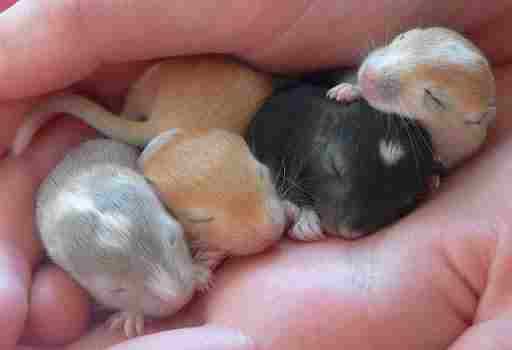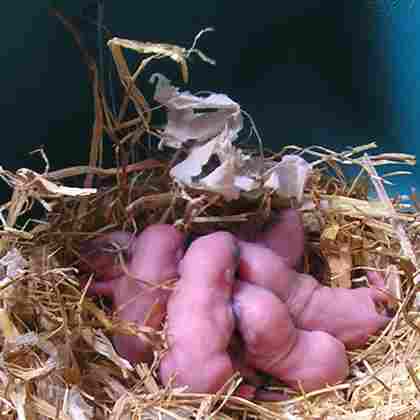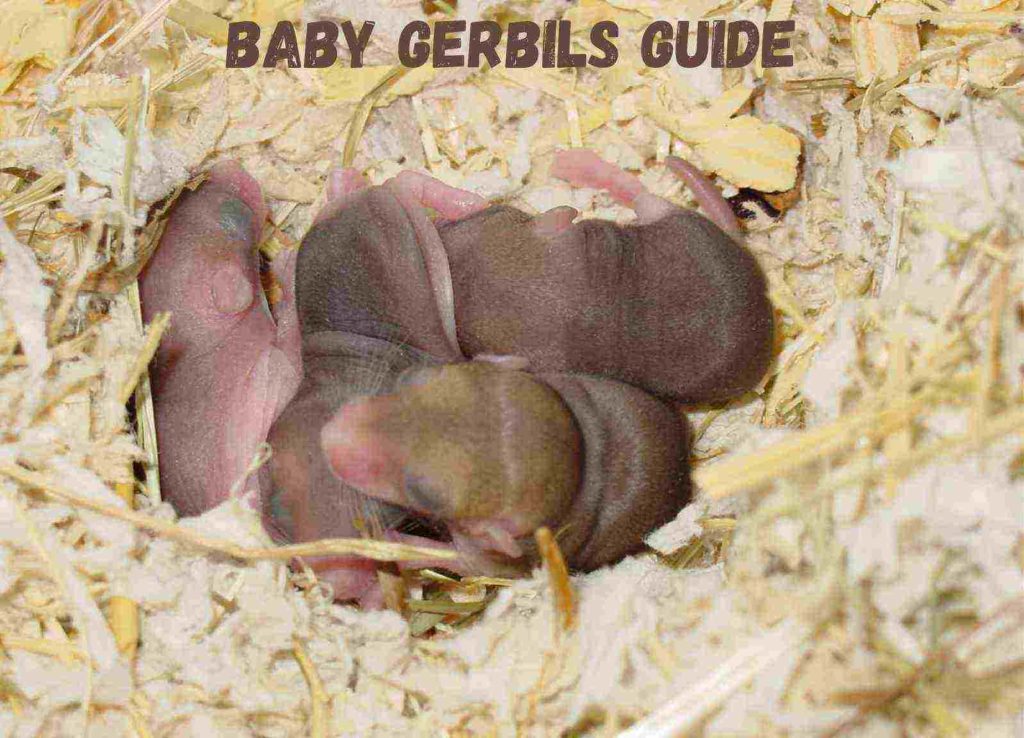Gerbils are cute and fun animals to watch so you can only imagine how adorable gerbil babies would be, but no matter how cute baby gerbils are you still have to care for them and most of us don’t really plan this in advance.
The first advice you get when looking to get a pet gerbil, is to get more than one gerbil, which is true and most new gerbil owners take home both male and female gerbils and keep them in one gerbilarium, and like all animals, they have a need to reproduce and in no time you find yourself with a handful of newborn gerbils while you’re still adapting to caring for adult gerbils.
Don’t panic this is what this gerbil pups guide is for, helping you care for unexpected baby gerbils, so let us start with the basics and make our way through how you can care for the little gerbils by simply answering the most common questions you could have as a new gerbil owner.
Gerbil babies are called pups, they are born pink and hairless, with their eyes and ears sealed, they open their eyes 17 to 19 days later some sooner than their siblings, a gerbil litter could be anywhere from three to nine baby gerbils, at this age, they are helpless and completely dependent on parents, they can’t regulate their body temperature and feed exclusively on mom’s milk.
Considering the short gerbil lifespan, gerbil babies don’t remain pups for long and can in the matter of a few weeks be totally independent. By the time they open their eyes baby gerbils would have already developed their teeth and start chewing on whatever they can get their teeth on.
This is the general information you need to know about newborn gerbils let us now move on to the common questions related to baby gerbils care.
Table of Contents
What are baby gerbils called?
This question we’ve already answered, gerbil babies are called gerbil pups, and they carry this name up until about five to six weeks old when they are considered fully grown gerbils can move on to living on their own.
In the wild, gerbil pups are completely dependent on their parents -if the father is around- and will be treated as such until eight weeks old when they are encouraged to leave the for the search of a new home.
How long does it take for a gerbil to give birth?
Gestation is typically around 24 days, during this period the female gerbil stays active and doesn’t show any signs of pregnancy.
It’s hard to tell if your gerbil is pregnant and in most cases, the owners only find out when the pups are born. If you’re paying close attention to your gerbils you can notice about two days before she gives birth that her stomach is swollen.
When do baby gerbils open their eyes?
Gerbil babies open their eyes at around 18 days, babies of the same litter don’t necessarily open their eyes at the same time.
Baby gerbils are adventurous and they start to venture and explore around the nest before they open their eyes using their sense of smell and touch.
How many babies do gerbils have?
A typical gerbil litter is about three to nine pups, but it’s not very uncommon to see one or two babies per litter or sometimes as much as ten pups per litter.
What we’ve noticed is that every litter is different even for the same parents they could have three the first litter and then the next they get nine pups.
Over their reproductive lifetime on average a gerbil couple could give birth to around 50 pups and sometimes much more than that.
How often do gerbils have babies?
When it comes to mating gerbils don’t have time to waste, females will often start mating again the same day they give birth.
However, while they’re nursing they won’t get pregnant right away but generally, if the male and female are not separated you can expect the next litter anywhere from 28 to 40 days later.
If you do not plan to breed gerbils, it is best to keep the male and female apart, or else you’ll find yourself overwhelmed with baby gerbils you can’t handle.
What do baby gerbils eat?
Baby gerbils grow up really fast and can gnaw on adult food at the age of three weeks, but they feed essentially on their mom’s milk up until the age of five weeks.
Gerbils from birth to two weeks old
Newborn gerbil babies from birth to two weeks old feed exclusively on their mom’s milk and can’t handle any other form of food.
At this young age, their teeth aren’t fully developed to handle seeds and adult food.
Gerbils From Two Weeks To four weeks Old
At this age, baby gerbils start to mouth and grew their tiny teeth which makes them able to gnaw on regular gerbil food like seeds and even fruits and vegetables(bananas, apples, carrots…).
However, under four weeks old baby gerbils are still dependent on their mothers and would feed on their milk when they get the chance, that’s why they should not be separated from their mothers.
Gerbils at five weeks and older
At five months old baby gerbils are weaned and their teeth are grown and they can feed on regular adult food permanently.
It is at this age that baby gerbils start to forage for their own food in the wild and prepare to leave the family nest to find a territory of their own.
How do gerbils recognize their babies?
Gerbils recognize their babies by smell, the gerbil’s sense of smell is very advanced. It allows them to differentiate groups of gerbils by the sense of smell without the help of sight.
This sense allows gerbils in the wild to keep to their own living territories and avoid confrontation from other family groups.
Can you touch gerbil babies?

You can touch gerbil babies but you have to be delicate since they still are fragile and can easily get injured, but In order to help the gerbils feel comfortable, you should avoid perfumes, lotion, or strong aromas when you handle the baby gerbils.
In some cases some gerbil moms will reject their babies and leave them to starve, sometimes they only feed a couple and leave the rest so it would be best if you don’t touch the babies, to avoid leaving any scent mark on them that would make the mom reject them.
Do gerbils kill their babies?
Killing their own babies is very rare in gerbils but sometimes it does happen, and there are multiple reasons for this behavior.
The most frequent reasons for gerbils to kill their own babies or abandon them:
- If the mom is too young and inexperienced and doesn’t know how to take care of her babies ( happens when a female mates too young).
- If the mom is stressed or constantly disturbed (like constant changes in the environment or people handling the babies too much)
- The babies are too sick to survive so the mom decides to only take care of the stronger ones.
- The mom has had too many babies in one litter more than she can feed so she’ll abandon the weakest or kill them.
- Accidents, sometimes moms especially younger ones are not very careful when handling their babies and could drop something on the nest killing their own babies.
Why do gerbils eat their babies?
Cannibalism is sometimes noticed in gerbils, gerbil babies are sometimes killed and eaten by their own moms, this is very rare and only happens in some specific cases:
- environmental disturbances/changes when the litter is still very young, any sudden change in the nest or cage could make the gerbils eat their own babies or abandon them.
- The lack of food or water would make gerbils eat their own babies.
- Baby gerbils born dead are eaten right away by the mom.
- Ill or too weak gerbils are generally eaten by the adults.
- Mom has too many babies than she can feed or has a mammal infection and can’t feed her babies.
When can you separate baby gerbils from mom?
At the age of six weeks gerbil babies are weaned and completely independent, they can be separated from their mom.
Most gerbil breeders separate the baby gerbils from their moms at the age of six to eight weeks at most, not that gerbil parents would mind having the older pubs in the cage but for space purposes and breeding management issues.
Young gerbils become sexually mature at the age of four months and females can be ready to mate at the early age of three months.
How to take care of baby gerbils

To be objective you don’t really have to care much for baby gerbils, they are completely dependent on their mothers for the first few weeks of their life and would feed almost entirely on mom’s milk.
Gerbil mothers are quite capable of caring for their babies and don’t need any help from you, and once they’re weaned they feed on regular food and need the same care you’ve been providing for their parents.
nonetheless, there are a few things you should be aware of to keep the gerbil babies healthy during the first few weeks of their life.
Maintaining the Environment
You should not make any changes to your gerbil’s environment especially in the first week, any sudden change in the cage could make the mom stressed and lead to abandoning or killing the pups.
Avoid cleaning, removing, or adding any objects(even bedding and toys) from the cage for the first week at least, the mom might turn her attention to reorganizing the cage and neglect her pups.
The dad should also be kept in the cage for the first week before taken out to avoid mating again and making new babies, but he does assist caring for the newborns so his absence could disturb the mom.
Avoid touching and handling the babies
It is best to restrain from touching the baby gerbils for the first week until they start developing a fine layer of fur.
If you have a strong smell on you it could be disturbing to the mother and she could neglect the ones you’ve touched.
It’s actually a good idea to touch and handle the pups after the first week so they can get used to your smell and get domesticated.
You want to be careful when handling the pups, even gerbil babies are fast and could easily jump out of your hand so make sure you’re holding them safely and have some safe soft surface beneath.
Keep an eye on your gerbil babies’ health
You should keep an eye on the baby gerbils’ health, in normal conditions gerbil pups are healthy, but sometimes some health issues may occur, most commonly respiratory problems and/or diarrhea.
Gerbil babies with respiratory problems make a clicking noise when they breathe, they are easy to detect, and they are in most cases serious and if untreated may be fatal the little gerbils.
Diarrhea is often a sign of “Tyzzer’s” or E.coli diseases and both are serious conditions that can easily be treated with antibiotics.
At the first signs of any health issues, it is best to take your baby gerbils to the vet to make sure they receive proper treatment and eventually stop the spread of any potentially infectious diseases to the rest of the litter.
Watch out for malnutrition
Gerbil mothers do care for their babies but when they spot weakness in one of their babies they might neglect, kill, or even eat him.
You want to look for any signs of malnutrition it usually shows in the form of bald patches on the fur, slow hair growth, and a smaller size than the siblings.
You can intervene by removing the other gerbil babies and letting the one who’s not feeding enough to feed uninterrupted, be gentle when you remove the other babies and place them in a safe area within the nest and make sure not to perturb the mom.
Repeating this process for a few days will enable the pup to get enough food and get his strength back to fight for his share of mom’s milk, especially that they start feeding on solid food soon enough so just try to maintain him alive until then.
Introducing solid food
You can introduce solid adult food to gerbil babies at around three weeks, but they will still feed on mom’s milk when they can.
Gerbil babies eat the same solid food as adults and you can even balance it with some fruits and vegetables.
Access to water
Make sure you adjust the height of the water bottle so the gerbil babies can reach it, they will start drinking water from the age of three weeks.
baby gerbils could have some difficulties locating the water bottle, so placing it closer to the nest and spraying a few drops next to it would help the pups locate the water source.
Placing a bowl full of water is not a good idea, even a small bowl could cause a baby gerbil to drown or if covered in water drop his body temperature especially that their fur is not fully grown and thick enough.
Preparing to separate the baby gerbils
At the age of six to eight weeks, the baby gerbils should be separated from their mother so until then you need to figure out what you want to do with them.
Moms won’t mind having the older gerbils around when the next litter is there but you should take into consideration how much space does your gerbils need to stay healthy and prosper.
What do you do with baby gerbils?

It is very common to come across this question in any gerbil forum, my gerbils gave birth to pups and I don’t know what to do with them.
When you are not planning for your gerbils to have babies and you can’t take care of too many gerbils it is best to get the same gender gerbils in the first place.
However, if you do get female and male gerbils it’s not a good idea to put them in the same cage since they’ll soon start mating and giving birth to new gerbil babies.
Sometimes at the pet store, they could make the mistake of selling a couple of gerbils as same-sex gerbils while they’re actually of different sexes and you soon find yourself with a litter of three to nine new gerbils to care for.
Whatever the reason you’ve ended up baby gerbils, whether it’s the breeder/pet store sexing mistake, or perhaps a rookie mistake of yours, you now have to deal with these little pups and many options open up to you.
Keep the baby gerbils
Keeping the gerbil babies even if not expected would be the best thing to do for them of course, gerbils are not very expensive pets to keep and their lifespan is short anyway.
The only reason why you would not want to keep the newborn gerbils would be the lack of living space, gerbils need around ten gallons of space and an extra five gallons per gerbil at least for a healthy setup.
You should keep in mind that you’ll need another cage anyway since you’ll have to separate the mom from the dad not to have other baby gerbils in no time.
If you do decide to keep the new gerbil babies measures need to be taken to make sure they are well set up and cared for properly.
However, the first thing you should think of is how to avoid having another litter in a month, so separating the father from the mom should be the top priority.
The father will have to live alone for a couple of weeks since the baby gerbils are completely dependent on their mom and can’t be separated before the age of six weeks.
Once your baby gerbils are big enough to be independent you need to sex and separate them into two groups, keep the females with their mom and move the males to the dad’s cage. It is important to get a professional to do the sexing part to avoid any unwanted surprises.
How much does it cost to keep the baby gerbils
Having another setup is not very expensive other than the first investment in a cage and a few toys, but in general, it will only take about 200$ – 250$ to get your gerbils a new home.
A typical gerbil litter is around six baby gerbils, so if you were planning on keeping two gerbils, you’ll have four times the amount of food to provide and double the bedding and that’s basically it.
Gerbils aren’t expensive pets to keep anyway, so if you’re not on a very tight budget you won’t notice a real bump in your expenses, the main problem with keeping gerbil babies is providing a large enough cage and that’s it.
There are plenty of ways you can cut your expenses by DIY some of the tools (you need to make sure you know what’s your doing) or the bedding but you can get a large bedding bag for less than 15 dollars so it’s not very expensive.
Giving the baby gerbils to animal shelters
The best way to get rid of unwanted gerbils is to give them to the animal shelter where they’ll try and find them a new home.
However, you need to keep the newborn gerbils with their mom until old enough to care for themselves which is six weeks at least.
Giving gerbils up for adoption at a shelter is an easy process, most shelters accept gerbils and all you have to do is call make sure they do take them and drop them off.
The staff will often ask a few questions about the general health of the gerbils their age, sex, and if they’ve been spayed or neutered and that’s it.
it is best to make sure the shelter or rescue center has a -no-kill policy, some shelters euthanize animals that they can’t find homes for.
It is also best to give the gerbil babies to the shelter as soon as they are old enough to be separated from their moms. Gerbils have a fairly short lifespan, so most families looking to adopt gerbils will prefer younger ones.
Giving the gerbil babies to a pet store
In case there are no animal shelters that accept gerbils near you the best option is to give them to pet stores.
Most pet stores would take baby gerbils as long as they’re not too old, past the age of four months most pet stores would not accept them.
Like shelters, some pet stores also euthanize animals that they can’t sell past a certain age so make sure to ask about their unsold pets policy.
Giving the baby gerbils to breeders
gerbil breeders are actually a great option if you can’t keep your baby gerbils, they have no reason to say no for a group of gerbils they’ll probably sell for 5$-10$ each.
What’s great about giving the gerbil babies to breeders is that even if they don’t sell they’ll just keep them for breeding purposes so you’re pretty sure the pups are going to be cared for and be safe.
Giving baby gerbils to friends and family
Many friends and family members would be interested in keeping baby gerbils you can’t keep yourself, so it’s better to start with your entourage first.
Make sure the person who takes the gerbils is a responsible person that will care for them and not just hand them to a kid who’d probably mistreat them.
One of the benefits of giving the baby gerbils to a friend or a family member is that you get to see them occasionally when you visit.
Selling your gerbil babies
Some of us make the most of every occasion, even an unwanted litter of gerbils could be a chance to make some money to reinvest on the ones you keep.
Breeders and pet stores sell gerbils for a price of 5$-10$ on average, so making a little discount on that price could encourage people to buy them from you if you can outreach to people.
These days you can sell anything online and a litter of gerbils isn’t going to be an exception, the only downside to that is that you can’t really know if the person who buys them will actually take care of them or no.
We generally advise against selling your gerbils to people you don’t know, most buyers online will use them to feed other pets such as snakes.
Releasing your baby gerbils into the wild
If you are thinking about how to get rid of unwanted gerbils and you can’t find any shelters or pet stores, the idea of releasing them into the wild might cross your mind, after all, there are gerbils that survive on their own in the wild.
Wild gerbils originate from the Mongolian desert and are not equipped to survive in another environment on their own, if they survive the climate they’ll find it really difficult to find enough food especially in the winter, and would make easy prey for predatory animals like cats and birds.
It is also irresponsible to release new species to an unknown environment, sometimes they could just die but sometimes they could take over and kill the entire ecosystem of the area and it happens a lot in various areas around the world.
Referenceshttp://jrscience.wcp.muohio.edu/nsprojects/ns1fall04/gerbils/backgroundinformation.html
https://www.sciencedirect.com/science/article/abs/pii/S0376635704000099
https://www.sciencedirect.com/science/article/abs/pii/0003347278900611
https://www.sciencedirect.com/science/article/abs/pii/S0003347289800156







